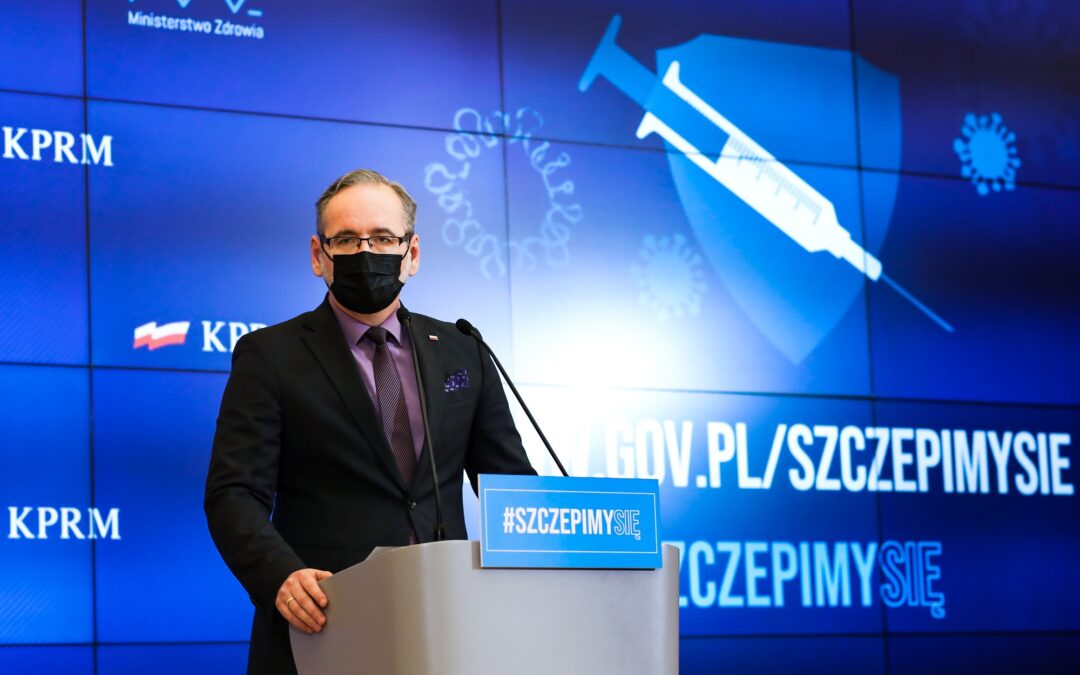The government has unveiled a series of measures designed to expand and accelerate Poland’s national COVID-19 vaccination programme, including allowing physios, pharmacists and medical students to administer jabs and opening the first drive-through vaccination points.
Meanwhile, the official in charge of the country’s vaccine rollout, Michał Dworczyk, has announced that the first Johnson & Johnson vaccines will arrive next week, sooner than expected.
Following concerns over a recent slowdown in the vaccination rate, the government announced last week that it was taking steps to accelerate the process. Today, Poland reported its highest ever daily number of administered vaccines, 244,748.
This morning, it was confirmed that the list of professions permitted to administer vaccines has been extended. It now includes dentists, nurses, midwives, paramedics, laboratory diagnosticians, pharmacists, military surgeons and physiotherapists.
Medical students in their final two years of study, as well as final-year nursing students under a doctor’s supervision, are also allowed to give the jabs.
“To date only doctors could qualify – this was a Polish peculiarity,” said Dworczyk today. “We are joining many European countries that conduct vaccinations in this way, and this has a positive influence on the rate.”
#Szczepimysię pic.twitter.com/4MfiebVvUe
— #SzczepimySię (@szczepimysie) April 9, 2021
Further details of expansion of the vaccination timetable were announced yesterday, including the opening of the first drive-through centre next Thursday, 15 April. The government also said that vaccinations would be administered in pharmacies from May, and in workplaces from May or June.
The first batch of 120,000 Johnson & Johnson vaccines will arrive in Poland in the middle of next week, ahead of schedule, Dworczyk confirmed yesterday.
“For months, Prime Minister Mateusz Morawiecki has been intervening in the EU about accelerating vaccine deliveries to Poland,” the minister wrote on Twitter, adding that Morawiecki had again spoken to European Commission president Ursula von der Leyen about the subject.
In an interview on RMF FM this morning, health minister Adam Niedzielski denied rumours that Johnson & Johnson vaccines were already being used in Rzeszów. There had been suggestions that the vaccines were being sent to the city, where a mayoral by-election is to take place next month.
Niedzielski promised that the National Health Fund (NFZ) would carry out checks, as “such activity would be illegal” as well as representing a danger to patients and meaning that the prosecutor’s office would have to be informed.
In a separate scandal, it emerged yesterday that a medical centre in Rzeszów had instructed staff to reuse syringes when administering coronavirus vaccines. However, its director said that the order had never actually gone into effect.
Meanwhile, many patients registered for an AstraZeneca vaccination are cancelling their appointment as a result of concerns over potential harmful side effects and trying to secure Pfizer jabs instead, reports TOK FM.
“Half of the people registered for Saturday for the AstraZeneca vaccination have cancelled,” a doctor in Łódź, Magdalena Muras-Skudlarska, told the radio station.
Another doctor in Białystok, Joanna Zabielska, was also frustrated by signing patients up for vaccinations, only to have more cancel. “Is this a job for us: to spend hours searching for people willing to have a dose of the AstraZeneca vaccine?” she asked.
Doctors administering vaccinations have also expressed frustration that they are currently unable to offer leftover doses to people who would like to be vaccinated but have not yet received an official electronic referral, reports TOK FM.
“Every day we get calls from younger people asking if they can get vaccinated. And we should vaccinate everybody,” said Muras-Skudlarska.
At today’s press conference, Dworczyk explained that, under the current system, patients not registered for a specific time may take the place of no-shows as long as they are one of the 10 million people already qualifying for registration and with a referral.
The government is considering measures to relax the rules to allow more people to take advantage of such opportunities, but now is not the right moment, he added. Dworczyk also denied reports in Rzeczpospolita that large numbers of vaccines were going to waste.
“Poland has one of the lowest indicators of vaccine waste in Europe,” he said, giving a figure of 0.09%. “This is down to the people who very professionally carry out vaccinations.”
Not for the first time, Dworczyk also appealed to opposition politicians to “rise above all divides” and unite in the vaccination effort.
“Regardless of what political formations or groups we represent, Poles will not forgive us if questions of their health and lives…become an element of political pushing and shoving,” he said, quoted by Niezalezna.pl. “We should collaborate, work together, to defeat the pandemic and implement the national vaccination programme.”
Dworczyk was responding to criticism from Warsaw mayor Rafał Trzaskowski, who in an interview with TVN24 yesterday said that the vaccination system “looks like another episode of chaos…We [the municipal authorities] will be ready on time, but the question is whether the government will supply us with vaccines”.
As of this morning, Poland had administered more than 7.26 million coronavirus vaccines, and almost 5.17 million people have received at least one dose, around 17% of the adult population.
Poland also today reported its highest ever daily number of coronavirus vaccines, 244,748.
The government recently unveiled plans to accelerate its vaccine rollout: https://t.co/HjzR5cxWxc pic.twitter.com/2RIipfvSXi
— Notes from Poland 🇵🇱 (@notesfrompoland) April 9, 2021
Main image credit: Kancelaria Premiera/Flickr (under CC BY-NC-ND 2.0)

Ben Koschalka is a translator, lecturer, and senior editor at Notes from Poland. Originally from Britain, he has lived in Kraków since 2005.




















